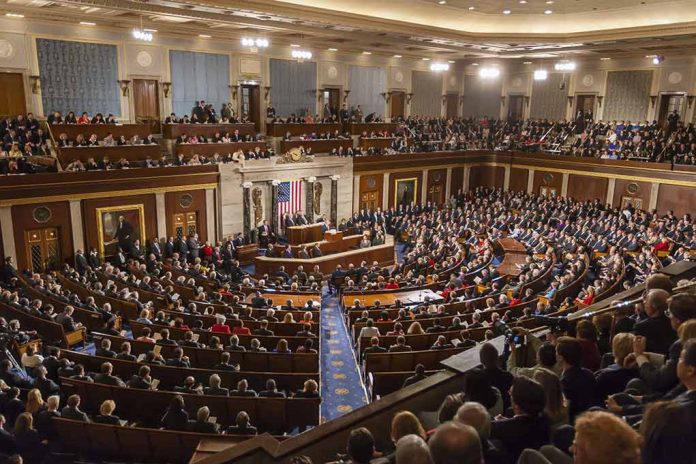
House Republicans’ ambitious budget plan proposes $880 billion in Medicaid cuts over the next decade, leaving Rep. Dusty Johnson of South Dakota defending the controversial measure despite growing opposition from both moderates and conservatives within the party.
Key Takeaways
- The House GOP budget plan narrowly passed with a 217-215 vote, revealing deep divisions within the Republican party over spending priorities.
- The proposal includes $880 billion in Medicaid cuts over 10 years while extending Trump’s 2017 tax cuts at a cost of $4.5 trillion.
- At least two Republican representatives had publicly opposed the bill, jeopardizing its passage as Speaker Johnson could only afford to lose one GOP vote.
- The budget resolution is crucial for Republicans to use reconciliation procedures that would allow fiscal legislation to bypass Senate filibuster rules.
- Rep. Dusty Johnson has emerged as a key defender of the controversial plan that balances tax cuts with significant reductions to social programs.
Narrow Victory Reveals GOP Divisions
The House Republican budget resolution recently passed by the narrowest of margins, with a vote of 217 to 215. This razor-thin victory underscores the significant challenges Speaker Mike Johnson faces in uniting his party around a fiscal vision that includes both substantial tax cuts and deep spending reductions. The budget blueprint directs various committees to find savings across federal programs, with the committee overseeing Medicaid specifically tasked with identifying $880 billion in cuts over the next decade.
Speaker Johnson has emphasized the importance of this budget as the foundation for implementing President Trump’s agenda. “This has been necessary because we promised to deliver President Trump’s full agenda, not just a part of it. We’re not just going to do a little bit now and return later for the rest. We have to do it now,” Johnson stated during the contentious voting process.
BREAKING: The House has passed the Republican budget resolution after a tumultuous night on the floor and resistance from Democrats and some GOP members. The measure increases the debt ceiling, extends President Donald Trump's signature tax cuts, and provides funds for border… pic.twitter.com/RsWakzYVbu
— NEWSMAX (@NEWSMAX) February 26, 2025
Opposition Threatened Passage
The budget reconciliation bill faced significant obstacles as at least two GOP lawmakers had publicly declared their opposition. Representatives Tim Burchett and Victoria Spartz have voiced concerns about the legislation, while Rep. Thomas Massie had expressed strong doubts about its fiscal impact saying “If the Republican budget passes, the deficit gets worse, not better,” Massie warned, highlighting internal disagreement about whether the plan truly addresses America’s mounting national debt.
“If I don’t get answers, I’m not going to vote for it, But if I can get some clarity and assurances, then you know, we’re moving a little bit more toward the ‘yes’ column,” stated Rep. Nicole Malliotakis, R-N.Y before the vote.
Reports suggested between six and ten Republicans from more moderate districts remained undecided, primarily due to concerns about the substantial Medicaid cuts and potential impacts on constituents who rely on these programs.
Dusty Johnson Defends Fiscal Approach
Representative Dusty Johnson of South Dakota has emerged as a key defender of the GOP budget plan. Appearing on “America Decides,” Johnson justified the controversial Medicaid cuts as necessary fiscal discipline while acknowledging the political challenges of reducing government spending. His position reflects the broader Republican commitment to extending the 2017 Tax Cuts and Jobs Act, which would cost approximately $4.5 trillion over the next decade.
The budget plan proposes increasing funding for border security, judiciary, and defense by $300 billion while seeking $1.5 to $2 trillion in cuts elsewhere. This approach has created a political tightrope for Republicans representing competitive districts, who must balance fiscal conservatism with protecting popular programs that benefit their constituents.
Strategic Importance of Budget Resolution
Beyond its policy implications, the budget resolution serves a critical procedural function for Republicans. Its passage enables the use of reconciliation, a parliamentary tool that allows fiscal legislation to bypass Senate filibuster rules and pass with a simple majority. For the Trump administration’s agenda to advance through a closely divided Senate, this procedural advantage is considered essential by GOP leadership.
The chaotic voting process revealed the challenges of governing with a slim majority. Conservative members initially revolted, seeking deeper spending cuts, while moderates worried about the political consequences of supporting such substantial reductions to Medicaid and other social safety net programs. Speaker Johnson’s ability to ultimately secure passage demonstrates his growing political skill, though the narrow margin suggests continued challenges ahead as specific spending bills move forward.
Sources:
Trump budget bill in peril as warring House GOP factions threaten rebellion
Johnson and Trump pull off surprising win to advance GOP agenda after vote whiplash in the House
House Passes G.O.P. Budget Teeing Up Enormous Tax and Spending Cuts
Rep. Dusty Johnson defends GOP budget plan













